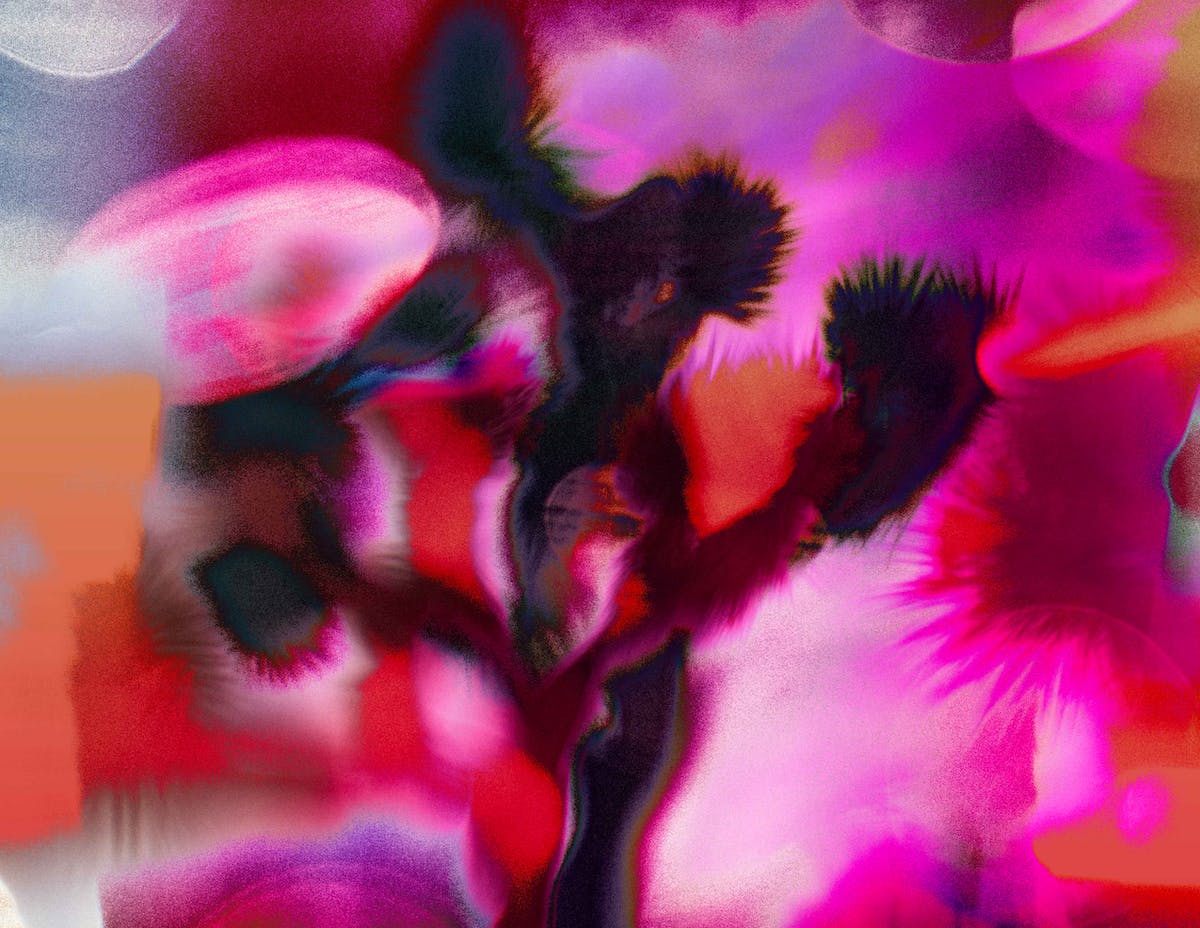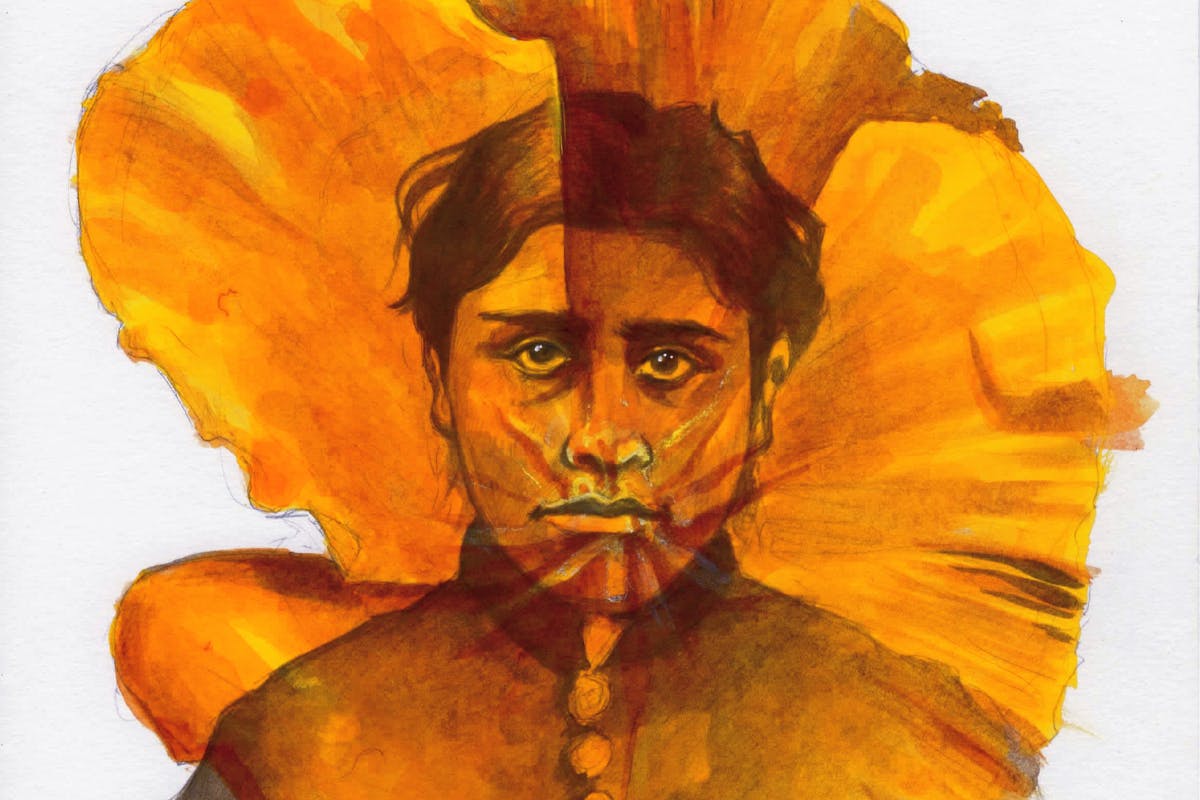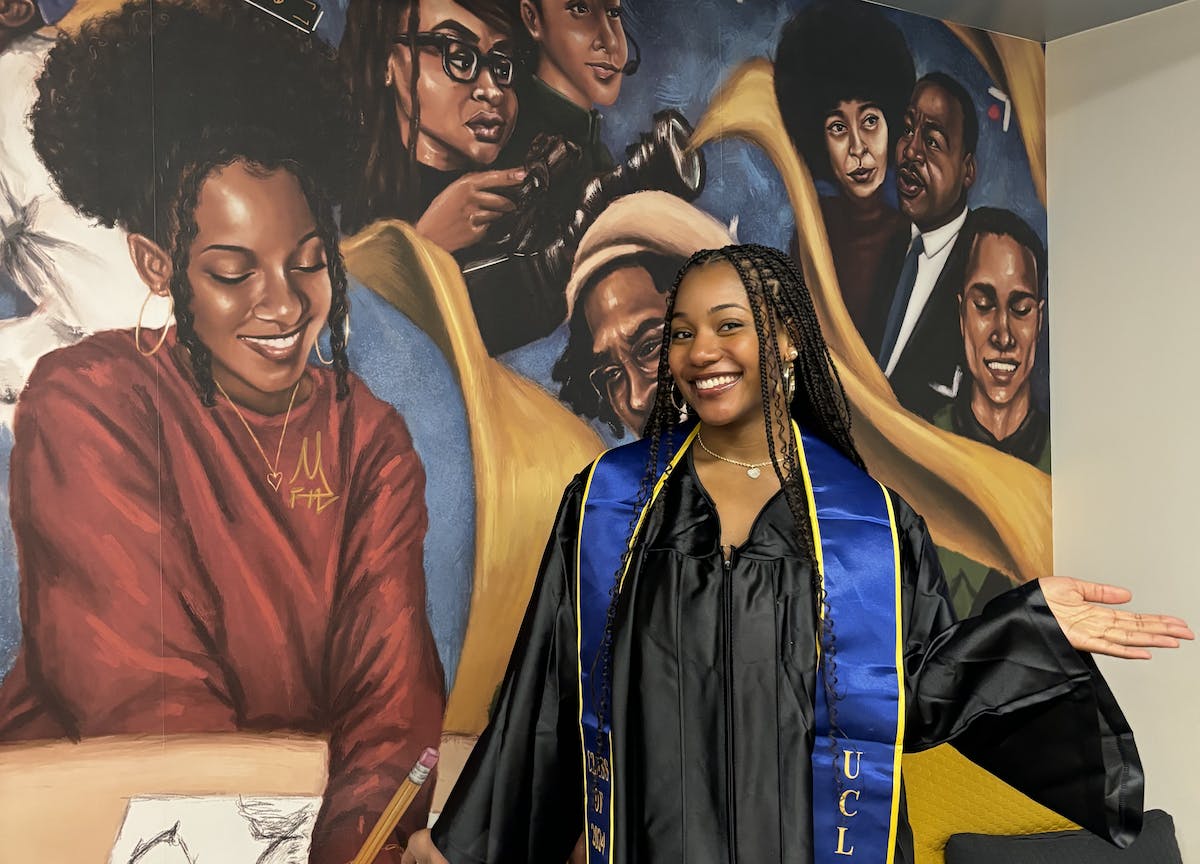10 faculty projects earn Chancellor’s Arts Initiative grants in 2024

A meditation on aging and identity for a solo dancer. A hybrid online–in-person theater performance derived from an artist’s personal internet search archives. An attempt to “hear” the needs of endangered Joshua trees. A slightly whimsical digital media exploration of C-rated Los Angeles restaurants. UCLA’s first major Juneteenth celebration.
These are among the 10 wide-ranging faculty-led projects awarded seed funding this year through the UCLA Chancellor’s Arts Initiative grant program, which fosters the advancement of the arts and arts-related scholarship on campus.
Administered by the Chancellor’s Council on the Arts and the Office of Research and Creative Activities, the program provided $133,900 to this year’s cohort, with grants ranging from $5,000 to $15,000 for projects spanning the departments of African American studies; design media arts; English; film, television and digital media; information studies; musicology; theater; and world arts and cultures/dance.
“We are proud to continue our commitment to support the creative work happening across our campus and want to recognize the importance of the arts in our institution’s research ethos,” said Roger Wakimoto, UCLA’s vice chancellor for research and creative activities.
The 2024 projects run the gamut of creative practice, including innovative and experimental digital media, film and theater productions; personal explorations of life and memory; and collaborative curatorial and presentation works that will uplift the lives and voices of undersung musicians and authors.
Since launching in 2021, the Chancellor’s Arts Initiative has granted more than $550,000 over four award cycles, supporting projects that range from high-profile documentary films and digital media works to new music and dance performances that have been presented across Los Angeles and around the country. Other past projects resulted in campus events designed to bring the UCLA community into deeper conversation with art and artists.
The 2024 grant recipients are:
Ask the Joshua Tree: Modeling Futures of the Mojave Desert Ecosystem
Steve Anderson, department of Film, Television & Digital Media
Ask the Joshua Tree is a digital media art installation using video, 3D modeling, projection mapping and generative AI to creatively envision the past – and suggest potential futures – for Joshua trees and the Mojave Desert landscape of Southern California. The project builds awareness of the uncertain future of Joshua trees, which were recently declared endangered by the state of California due to the threat posed by climate change. Examining these iconic trees and their fragile desert habitat through visualizations and interactions rooted in both human vision and machine vision, this project aims to decenter the anthropocentric perspective in order to ask the Joshua Tree – which has existed for over 2.5 million years and survived multiple ice ages – what it needs. The resulting artwork imagines new possibilities for the co-evolution of Joshua trees and humans in the age of the Anthropocene, based on information encoded into the trees themselves.
“WHAT IT IZ: The Spoken Wordical” — a Hip Hop Theater Collaborative
Bryonn Bain World Arts and Cultures/Dance
“WHAT IT IZ: The Spoken Wordical,” is a hip hop theater production created by women incarcerated at the California Institute for Women enrolled in the 2016 UCLA Creative Writing Workshop. This project – a staged production of “WHAT IT IZ” – is a collaboration between UCLA students, community members, that will fuse prison activism, hip hop theater, spoken word poetry, through UCLA’s Prison Education Program— and include presentation collaborations with the Geffen Theater and The Actors Gang. This restaging of “WHAT IT IZ” will be produced through a UCLA course in which students will stage a contemporary work based on class sessions with community actors, along with reading discussions and opportunities to hear from guest speakers, artists, and activists from the broader Los Angeles community.
Prelude to Juneteenth Day Celebration: A Multimedia Event
Cheryl Keyes, African American Studies
Since the recent signing and declaration of Juneteenth Day by President Biden nearly three years ago, the UCLA Department of African American Studies is planning its celebration of Juneteenth Day, aptly called “Prelude to Juneteenth Day Celebration: A Multimedia Event.” It is scheduled on June 5, 2024 at Royce Hall, 7 p.m. The program is organized into three parts: pre-transatlantic slavery (a salute to West African Empires), transatlantic slave trade and Black life in 1619 (colonial era), enslavement to freedom, and aspects of contemporary Black Life in the US. Highlights of the event include two world premiere works, “Symphony No. 4” also known as “Juneteenth Symphony” by Earl Louis Stewart and “Sundiata Keita Overture” by Cheryl Keyes, performances by well-known artists including violinist extraordinaire Karen Briggs, alumnus dancer Bernard Brown, and a host of vocal soloists, choral performances from spirituals to gospel music, West African dance ensemble, spoken word, smaller instrumental combos, and orchestra with guest conductor Antoine T. Clark. Admission is free to the general public.
“Trouble the Water: Celebrating the HBCU Choral Tradition through the Music of Undine Smith Moore”
Raymond Knapp, department of Musicology and Jordan Hugh Sam, Musicology graduate student
This research project unites scholarship and performance to consider the music of Undine Smith Moore, widely considered the “Dean of Black Women Composers,” and the choral tradition from Historically Black Colleges and Universities. Moore was a Professor at Virginia State Universities, one of the first public HBCUs, where she taught piano and theory, composed choral music, and ran the Black research center. While her legacy is celebrated at VSU, it has not been as widely embraced by the choral community. In collaboration with Virginia State, UCLA researchers will conduct archival work and oral history to prepare three performers’ editions of Moore’s choral music. During winter quarter 2024, UCLA will host the VSU Concert Choir for a weeklong residency that will involve two interactive workshops focused on the concerted spiritual and gospel performance practice, rehearsals with the UCLA choral ensembles, and a concert in which the three recently prepared manuscripts will be performed in an intercollegiate collaboration. Alongside the concert, the Center for Music Humanities will host a symposium focused on the history of spirituals, the HBCU choral tradition, and issues of appropriation and ethics when approaching African American Music.
Sonidos Nuevos
Marissa López, department of English, division of Humanities
Building on Los Angeles city librarian Charles Lummis’ (1859-1928) foundational ethnomusicology of the early-20th century, we propose to create a new, living archive of Latinx Los Angeles sound. Working with local artists, researchers will explore the musical history of Los Angeles’ 19th century. After an introduction to extant sheet music and wax cylinder recordings, artists will be invited to create new songs in their own, unique styles, inspired by the city’s musical history but with the goal of creating a soundtrack for the future. We’ll promote the resulting album with live, community- building events and a short documentary film, created in partnership with SoLa Creative, a new project out of SoLa Foundation’s Tech and Entrepreneurship Center, which trains youth in South Los Angeles to be design and media arts leaders.
Collecting through Absence: Rewriting the Narrative of 'Refugee' Film & Community Arts Toolkit
Cindy Nguyen, Department of Information Studies (School of Education & Information Studies) and digital humanities program
This project brings together archival and artistic fragments of displacement into a digital interface of community memory and public knowledge including an autoethnographic film which rewrites the narrative of refugee exodus and will be a part of a public community arts toolkit. The film will explore the temporalities of ‘home’ and ‘history’ through the layered storytelling of the ‘refugee boat journey’ as intertwined intimate family history and ‘official’ global history of mass displacement. The film will be part of the experimental website and community resource ‘Collecting Through Absence Toolkit”, actionable practices to facilitate arts creation within communities, families, and classrooms as part of empowering, liberatory memory work. The toolkit will include printable worksheets for facilitating multilingual intergenerational conversations, curation, remix-collage, and historical activation activities, question frameworks, and creative writing prompts focused on supporting and empowering multilingual communities to experiment in arts as a tool for healing, connection, and re-narrativizing.
Social Soundware
Casey Reas, Design Media Arts Department, School of the Arts and Architecture
Social Soundware is dedicated to examining the politics of sound in Los Angeles. How do we relate to our sonic environments? How does sound influence our relationships with each other and with the city? Social Soundware examines these questions through a series of artist residencies and public interventions. UCLA Social Software will facilitate the creation of sound artworks to be installed in public spaces around Los Angeles. Potential sites include UCLA’s main campus in Westwood, UCLA Downtown, and UCLA Research Park, the former Westside Pavilion. This project takes its inspiration from Electronic Cafe ’84, a public art project by pioneering artists Kit Galloway and Sherrie Rabinowitz staged alongside the1984 Los Angeles Olympics.
“DaddyAF: Waiting for Peter Pan”
David Rousseve, World Arts and Culture/Dance; School of the Arts and Architecture
Writer, choreographer, filmmaker, and performer David Roussève creates his first evening-length solo in more than 20 years. Daddy AF braids words, video, movement, and sound to craft a meditation on life's purpose from a queer African American man acutely aware of the finite time he has left on the planet. Like strands of DNA, it connects elements encoded in Roussève’s body, including 600 years of family genealogy, his roller coaster journey as a queer HIV+ cis man, and the shattering suicide of his former husband of 26 years—along with solo excerpts from 35 years of his dance company’s repertory, and a new movement vocabulary
exploring the meaning of virtuosity for a 64-year old body. Daddy AF seeks to generate dialogue around the elusive nature of love and the very meaning of existence; along the way posing questions to viewers around the nature of legacy, fulfillment, liberation, and social justice. The work will be completed and debuted by Fall 2025.
The Shape of “Critique”: Black femme film criticism of the 1970s
Ellen Scott, Department of Theater
For Black women historically, "critique" has been about establishing and asserting a worldview at odds with the dominant that stands to alter the conditions of our own lives and is, thus, a matter of survival. Though “film critic” was chiefly a male profession, the 1970s "Black" filmmaking explosion combined with rising intersectional feminist activism created conditions for a proliferation of Black women critics to find words and venues for film readings that burned. This video essay brings together the work of a cross-section of 1970s critics, including Bonnie Allen at Essence, Willette Coleman with Git Down Media, Sheryl Fitzgerald in the Norfolk Journal and Guide and Dorothy Dean of the self-published Lavender Film Review. These women developed film critique as a mode of articulating self. Through analysis of their reviews of Blaxploitation, Independent, and Hollywood films, the project will develop the concept of “Black femme film critique” as an historical and theoretical framework for understanding Black women’s film writing as a subset of American intellectual history and a site of productive dissent and creative production. This project will also draw from a broader group of texts including the work of writers Harriet Jacobs, Sylvia Wynter, Barbara Smith, and Michelle Wallace.
"Show Full History"
Marike Splint, department of Theater
“Show Full History” is a personal theater essay that combines the liveness of theater with the seemingly endless archive of the internet. Our internet browsing histories have become our diaries, documenting the twists and turns of our repetitive online behaviors, impromptu associations, and our most naïve questions. Using her own search history as a performance script, theater maker Marike Splint takes the audience on an internet rabbit hole tracing her family’s history of migration from North Africa, a crime of passion, the generational impact of colonial rule, and the pre-internet social phenomenon Habiba Msika - a radical performer breaking all the rules of 1920s Tunisia. Composer Jonathan Snipes and media designer Hana S. Kim transform this documentary narrative into an immersive hybrid live/online experience through live media processing and scoring. Show Full History is a journey to the edges of the internet, and our memories.This project has been commissioned by HERE Arts Center in New York, a renowned institution known for producing innovative theatrical work, which will also present the work.
The ‘C’ for Connoisseurs Restaurant Guide
Eddo Stern, department of Design Media Arts
Exploring the tensions among culinary adventurism, multiculturalism, foodie fetishization, the body and its mental and physical boundaries, the “‘C’ for Connoisseurs” project will create both print and online restaurant review “guides” of the best ‘C’-graded restaurants in Los Angeles County. A small team of reviewers will visit selected ‘C’-graded restaurants as listed on the public county health inspection database, write about the experience, and document the food they eat using 3D photography. The results will reveal provocative questions about the complex network of meanings at play in the act of eating out as a cultural practice in Los Angeles. The resulting guide will provide a counter-discourse to the cultural biases of letter-grade systems and prestigious food guides alike, as well as offer a playful, parodic critique of pervasive, culinary adventurism or “stunt eating” attitudes and exhibitionistic cultural production around exoticized food consumption.
By Jessica Wolf
Posted June 3, 2024

